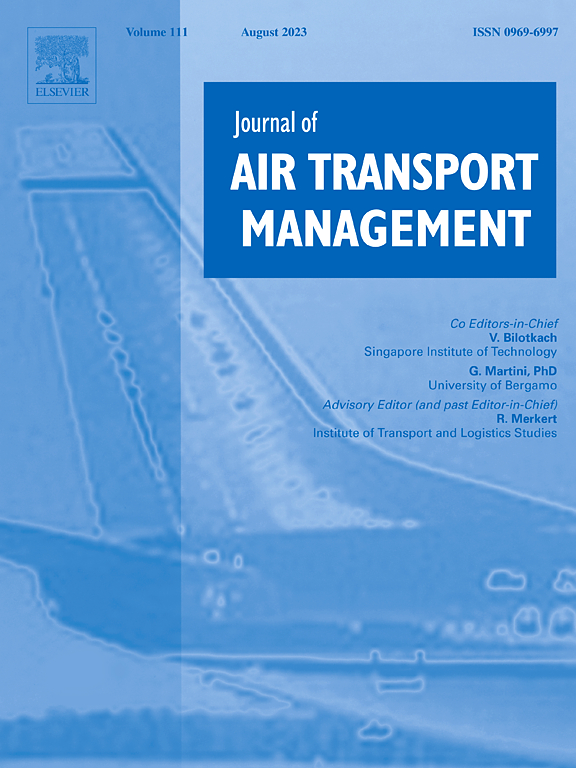技术进步与航空公司生产力偏差:外部干扰下的网络MPI分析
IF 3.6
2区 工程技术
Q2 TRANSPORTATION
引用次数: 0
摘要
本研究旨在探讨两阶段网络生产技术结构中技术进步及其在不同要素和产出之间的偏差对航空公司生产率变化的显著影响。为了解决外部干扰和市场波动下的生产率变化,本研究开发了一种新的网络Malmquist生产率指数(MPI)分解模型,识别了投入和产出之间的群体间偏差以及投入因素和产出之间的群体内偏差。该研究分析了2015年至2021年全球16家航空公司的数据,衡量了网络生产框架内的生产力变化及其组成部分。对技术变革进行分解,分析劳动力和运营费用等投入因素、可用座位公里数和可用货运吨公里等中间产品、收入客运公里数和收入货运吨公里等产出因素的偏差特征。研究结果表明,效率提高和技术进步是生产率增长的主要驱动力,而偏向于产出的技术变革限制了这种增长。服务阶段的效率提高、技术变化幅度增加和投入偏向的技术变化有助于整体生产率的提高,减轻了生产阶段效率恶化和技术变化减少的负面影响。值得注意的是,由于COVID-19大流行等外部冲击造成的运营中断,2020-2021年期间生产率出现回落。这些结果表明,在特定的生产和服务阶段,有针对性的技术进步和效率提高可以显著影响整体生产率。该研究为航空公司提供了应对干扰的战略见解,强调了理解和管理技术偏差对提高生产力的重要性。本文章由计算机程序翻译,如有差异,请以英文原文为准。
Technological progress and biases in airline productivity: A network MPI analysis under external disruptions
This study aims to investigate the significant role of technological progress and its biases among different factors and outputs within a two-stage network production technology structure in influencing productivity changes in airlines. To address variations in productivity under external disruptions and market fluctuations, this study develops a novel network Malmquist Productivity Index (MPI) decomposition model, identifying both inter-group biases between inputs and outputs and intra-group biases among input factors and outputs. Analyzing data from 2015 to 2021 for 16 global airlines, the study measures productivity changes and their components within the network production framework. The technological change is decomposed to analyze the bias characteristics of input factors such as labor and operational expenses, intermediate products like available seat kilometers and available freight ton kilometers, and output factors including revenue passenger kilometers and revenue freight ton kilometers. The findings indicate that efficiency improvements and technological progress are primary drivers of productivity growth, while output-biased technological change limits this growth. Efficiency improvements, increased magnitude of technological change, and input-biased technological change in the service stage contribute to overall productivity gains, mitigating the negative impact of efficiency deterioration and reduced technological change in the production stage. Notably, productivity regressed during 2020–2021, reflecting operational disruptions caused by external shocks such as the COVID-19 pandemic. These results suggest that targeted technological advancements and efficiency improvements in specific production and service stages can significantly influence overall productivity. The study provides strategic insights for airlines to navigate disruptions, emphasizing the importance of understanding and managing technological biases to enhance productivity.
求助全文
通过发布文献求助,成功后即可免费获取论文全文。
去求助
来源期刊

Journal of Air Transport Management
TRANSPORTATION-
CiteScore
12.40
自引率
11.70%
发文量
97
期刊介绍:
The Journal of Air Transport Management (JATM) sets out to address, through high quality research articles and authoritative commentary, the major economic, management and policy issues facing the air transport industry today. It offers practitioners and academics an international and dynamic forum for analysis and discussion of these issues, linking research and practice and stimulating interaction between the two. The refereed papers in the journal cover all the major sectors of the industry (airlines, airports, air traffic management) as well as related areas such as tourism management and logistics. Papers are blind reviewed, normally by two referees, chosen for their specialist knowledge. The journal provides independent, original and rigorous analysis in the areas of: • Policy, regulation and law • Strategy • Operations • Marketing • Economics and finance • Sustainability
 求助内容:
求助内容: 应助结果提醒方式:
应助结果提醒方式:


